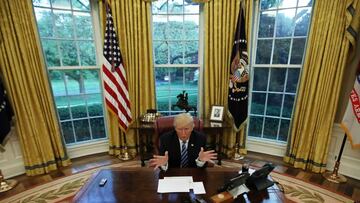US Impeachment: when will Donald Trump leave the White House?
The twice-impeached President is due to leave on Biden's Inauguration Day, but with impeachment proceedings ongoing will Trump last that long?


On Wednesday 13 January Donald Trump was impeached for the second time in the House of Representatives, making him the first president to be impeached twice. The decision in the House was the most bipartisan in history, with ten Republican lawmakers crossing the floor to vote in favour of impeachment.
A former senior Trump administration official tells me he believes there are enough Republican votes in the Senate to convict and remove President Trump if they get articles of impeachment from the House.
— Eamon Javers (@EamonJavers) January 13, 2021
Many have called for Trump to be removed from office for his role in the Capitol Hill riots last week that left five people dead. Impeachment can lead to dismissal but only once the Senate has voted on the charge made in the House. There is certainly some bipartisan support for Trump being removed prematurely, but can it be achieved before he is due to leave the White House on 20 January?
McConnell refuses to recall Senate for rushed impeachment trial
The impeachment process in the United States is comprised of two parts; a charge is first brought by the House of Representatives, and it is then voted on in a trial in the Senate. Trump became the third president to be impeached in the House, but so far none have been convicted in the subsequent Senate trial.
The House of Representatives was able to pass the articles of impeachment in a single day because the Democrats hold a majority there, and because they were not looking to decide guilt. In the Senate the process will be much more laborious, with evidence, witnesses and arguments for the defence to be heard.
As it stands the Senate is not scheduled to return until 19 January, just one day before Trump is due to leave office. In recent days Senate Minority Leader Chuck Schumer had called on Majority Leader Mitch McConnell to utilise an emergency ruling founded in 2004 to reconvene the Upper House early. However McConnell has refused to do so, arguing that a trial of this importance requires more time to consider.
In a note sent to Republican colleagues, he added: “I have not made a final decision on how I will vote and I intend to listen to the legal arguments when they are presented to the Senate.”
From colleague Mike Emanuel. Fox is told McConnell is furious and "done" with Trump. He hopes that impeachment could help remove Trump from the GOP. McConnell believes Trump lost the GOP its Senate majority.
— Chad Pergram (@ChadPergram) January 12, 2021
Could Trump choose to leave the White House early?
With the impeachment trial highly unlikely to be concluded until after Trump leaves office, it seems that any decision to leave early will be his own. There had been calls from House Democrats, most notably Speaker Nancy Pelosi, for Vice President Mike Pence to invoke the 25th amendment but Pence has made clear that he will not.
There is, however, a chance that Trump may choose to leave the White House of his own accord. He is known to have been considering presidential pardons in his final weeks in office, drawing up a list of allies, family members and political supporters to offer impunity to. Some reports suggest that he has also inquired about the possibility of pardoning himself, although constitutional lawyers are unsure about the legality of such a move.
President Trump has been asking aides and lawyers about his self-pardon power, multiple sources tell CNN. https://t.co/9HrwCxKPzK
— CNN (@CNN) January 8, 2021
Alternatively, if Trump were to resign during his final days in office he could then be pardoned by Pence, who would replace him as president. This would be an extremely controversial move but there is precedent. In 1974 outgoing President Richard Nixon was granted a full and unconditional presidential pardon by President Gerald Ford, who had assumed the role shortly before after Nixon resigned.
However the pardon, related to the Watergate Scandal, required an admission of guilt from Nixon; and it remains to be seen if Trump would be willing to do the same. Unless Trump’ final days in office feature a surprise tactical resignation, it seems highly likely that he will remain in office until 20 January.
Trump snubs inauguration traditions
Related stories
Although the President has now publically accepted that he will be leaving office shortly he will depart the White House with none of the tradition and niceties of his predecessors. Trump’s administration has only recently allowed the Biden – Harris transition team access to sensitive information like the presidential briefings, and there was no Oval Office reception for the President-elect.
WASHINGTON (AP) — AP source: Trump to leave Washington, D.C. Wednesday morning, before Biden's inauguration.
— Kyle Griffin (@kylegriffin1) January 15, 2021
Trump’s team have also confirmed that he will not be attending Biden’s inauguration, the first time a president has skipped their successor’s inauguration since Andrew Johnson in 1869. However Biden may not be too disappointed with this, given that on all three occasions when the previous president has refused to attend an inauguration, the incoming president has gone on to win a second term.

